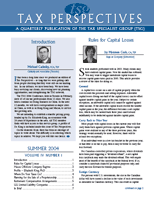
PDF Format
 Issue Contents Issue Contents
 All Issues All Issues
Summer 2004
Volume 4, Number 1
The information in Tax Perspectives is prepared for general interest only. Every effort has been made to ensure that the contents are accurate. However, professional advice should always be obtained before acting on the information herein.
Where Do Your Taxes Go?
By Michael Cadesky, FCA, TEP
Cadesky and Associates LLP (Toronto)
A client of mine called recently to ask an intriguing question: "Do I have any say in where my taxes go?" I was tempted to simply say no, but then I thought about it for a while. The answer may surprise you. Like many Ontario taxpayers, my client was upset over recent events in the province. Aside from the SARS crisis, which almost brought Toronto to a halt, there is the Ontario budget deficit, in excess of $5 billion dollars. He could not understand how the former Minister of Finance, Janet Ecker, presented a budget, in March 2003, which showed that the books were balanced. Even though the budget was presented in an unorthodox way, which may have contributed to Ms. Ecker losing her seat in the ensuing election, it is still incredible to think how budget projections could have been so wrong. And even if they were wrong, he wondered why the ballooning deficit was not brought to the attention of Ontario taxpayers at a far earlier stage. On the heels of this came the announcement, by Premier Dalton McGuinty, that various campaign promises will not be kept. The cap on hydro rates, which was promised, will not be respected, and Mr. McGuinty blames, in part, the unexpected provincial deficit. Regardless of who or what is to blame, a promise is a promise, or is it? Then came the no-tax increase budget of May 2004, complete, of course, with its disguised tax increase. At the other end of the scale, taxpayers are expected to conduct themselves according to a strict code of conduct. You self-assess your tax, file complete information returns to assist the government in verifying your tax, and pay your tax on a timely basis. Furthermore, you are required to make accurate estimates of your income for the purposes of paying tax installments. If you fail to do these things, my client noted, you will be charged interest and, depending on the circumstances, penalties as well. Furthermore, if you supply false information, you may be subject to criminal prosecution. You could even go to jail. Now back to the original question, where do your taxes go? The answer is that it very much depends on the nature of your income. Employment income is taxed where the person earning the income is resident. The federal government and your province of residence each get a share (roughly 2/3 to 1/3). If the employment is carried out in a foreign country, a credit is given in Canada for the foreign tax paid. The credit is first applied to federal tax, and then to provincial tax. If the income is business income, then it is sourced to the province or country where the income is earned. For example, if an Ontario resident earns business income in Alberta, tax will be paid federally and to the province of Alberta. Most other types of income earned by individuals result in tax being paid to the province where the individual resides, with a credit for foreign taxes paid if applicable. For interest and dividend income, this foreign tax credit is limited to a maximum rate of 15%, coincident with the rate applicable in most of Canada's international tax treaties. But, what if you deliberately wanted to pay tax to a different country or province, could you do so? The easiest income to "shift" is investment income. To do this, normally one would use a trust. For example, if the income were earned by a trust resident in Alberta, and if the income were retained in this trust and taxed on this basis, then federal and Alberta tax would be paid on the income, rather than Ontario tax. In the past, people have used this strategy, since Alberta tax rates are lower than Ontario's by about 7% at the top tax bracket. If one wished to favour a foreign jurisdiction, then it is also possible to use certain techniques, such as establishing a trust in that jurisdiction, to pay tax on the investment income. Tax would also be paid in Canada, but a credit would be given for the foreign tax. However, this will not necessarily save you tax, and may in fact prove more expensive on dividend and interest income due to limitations in the foreign tax credit mechanism. It is also possible to establish a trust in a tax haven jurisdiction, which will be free of foreign tax. In this situation, the investment income would be taxable by Canada, since the trust would be deemed a resident of Canada. However, rather than paying tax in a province, an additional level of federal tax would apply. Depending on the province of residence, a small tax savings might result. A large tax revenue shift will also occur, in favour of the federal government at the expense of your province of residence. Lastly, in lieu of paying tax, you can always give money to charity. In summary, it may come as a surprise to many people to learn that you do have some discretion as to where your taxes go, even though you may not be able to influence the total amount you pay. Keep in mind that if you do redirect your taxes, it will have an impact, however modest, on the finances of the Canadian federal government and the province in which you live.
|